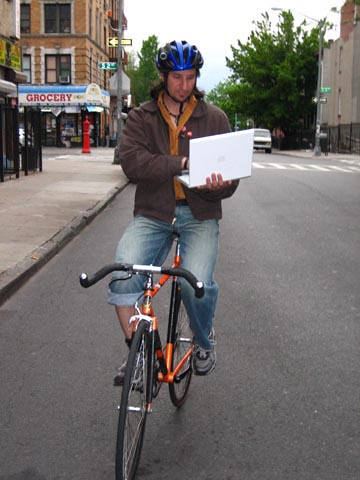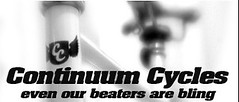Bio-Diesel...it's real
here is a recent article from the New York Times about one such person here in New York that is seeking a serious alternative to fossil fuels:
December 27, 2004
By ALAN FEUER
Brent Baker sees one answer to the energy crisis in the
ordinary French fry. His logic goes like this:
Wherever French fries are consumed, there is bound to be a
quantity of cooking grease. Diesel engines can be made to
run on grease. It therefore stands to reason that the
French fry, if made in quantity, can result not only in a
side dish. It can be counted on, as well, to leave behind a
cheap supply of fuel.
Humble as this proposition seems to be, Mr. Baker, an
environmentalist who moonlights as a carpenter, has proved
that it can work. He has taken a 1989 International Blue
Bird school bus and hooked some filters and hoses to its
engine, and now careers through town and through the
country on discarded grease alone.
The ride is smooth and quiet, and his bus smells something
like a barbecue. As for the fuel tank, he pulls into
roadside diners when the gauge is running low.
"What I usually say is, 'Hey, I got a bus outside that runs
on grease,' " said Mr. Baker, who is 34, wears a watch cap
on his head and a soul patch just beneath his lip and is
known as Arrow in the hipper quarters of New York.
"Then I say, 'I notice you've got some nice grease in your
Dumpster out there. Mind if I clean it out?' "
Usually they do not and usually he does. Mr. Baker traveled
15,000 miles last year on S.V.O., or straight vegetable
oil, carrying his deep-fried vision of alternative fuel
across the United States.
As it happens, he is not alone in his belief that vegetable
oil, available in grocery stores and greasy spoons, might
someday prove a viable source of fuel. The fleets of more
than 40 federal and state agencies across the country
already run on a blend of diesel fuel and vegetable oil,
according to the Environmental Protection Agency. Last
month, DaimlerChrysler introduced the Jeep Liberty Common
Rail Diesel, which runs on a similar blend of fuel. There
is even a salt mine in Kansas, operated by the Hutchinson
Salt Company, that just last week became the first mine of
any kind in the United States to run on diesel fuel and
grease.
Mr. Baker, as a purist, prefers to run his bus on grease
and grease alone. Beneath its windows is the slogan: "This
Bus Runs On Vegetable Oil." He gets 10 miles to the gallon.
More important, he fills the tank for nothing. And grease
does not give off many of the dangerous emissions that
fossil fuels do.
As a devotee of S.V.O., he acknowledges a debt to Rudolf
Diesel, who introduced the diesel engine at the World
Exhibition in Paris in 1900. Dr. Diesel planned, at first,
to run his engine using peanut oil as fuel. Since then, the
diesel has been modified to run on petroleum, which is,
historically, the least expensive and most easily
obtainable type of fuel.
Still, it is child's play, Mr. Baker said, to reconfigure
diesel engines to run on grease. It is mainly a question of
heating the grease to reduce its natural viscosity. The
grease also must be kept clean.
To that end, he has installed beneath the bus a 10-gallon
"warm-up tank," which heats the grease in the 40-gallon
main tank until it flows smoothly through the fuel-injected
engine. He also jury-rigged a filter system that prevents
small bits of deep-fried cod or French fries from clogging
the fuel lines.
"You can go on the Internet, get the conversion kit and
start running grease this afternoon," he said. Those
familiar with the insides of a car should expect to pay
about $800 for the kit alone. It will cost an additional
$700 for a professional mechanic to install it, he said.
Mr. Baker's interest in grease began in 1995, when he was
traveling the country with an acting troupe and discovered
that "the lion's share of the money we were raising went
straight to Shell." The acting troupe was of the sort that
staged environmentally conscious, anti-corporate political
sketches. It seemed to contradict its mission to spend its
money in support of Big Oil.
As the story goes, they came across two women somewhere
east of San Francisco who were cooking up a blend of grease
and diesel with some cheesecloth and a Bunsen burner on the
side of the road. "They said, 'Yeah, we're making
biodiesel," he recalled. Mr. Baker was immediately hooked.
Shortly after, he heard talk of a group of young
Australians who had gone all the way and started powering
their vehicles on S.V.O.
"These mad-scientist geniuses had altered their fuel lines
and heating lines to run on straight vegetable oil," he
said. After years of interest, Mr. Baker was the lucky
recipient of a bus donated to him by Greenpeace in February
2003.
These days, he travels from New York to Texas, stopping off
in spots like Kansas City, to promote his concept of using
grease as fuel. He is often in the company of his daughter,
Felix, a precocious 9-year-old.
While journeying, the bus is both a working demonstration
of his concept and a makeshift mobile home. The seats have
been removed and cots installed. There is a hi-fi system
that is powered, by way of solar panels, by the sun.
When Mr. Baker is at home, he parks the bus in the
flatlands of Williamsburg, Brooklyn. There it sits on
winter afternoons with environmentalist stickers on the
dash and a pair of fuzzy dice hanging from the rearview
mirror.
An ambitious man, Mr. Baker plans this spring to open a
biodiesel service station, possibly in Williamsburg, where
like-minded motorists can fill their tanks with the blended
fuel at a series of gas-like pumps. The project will
require a set of 50-gallon drums, some rubber hoses and a
centrifuge for blending. "It's not much more complicated
than making moonshine," he explained.
As he conceives of it, the service station will produce
some 200 gallons of fuel a month, which pales in comparison
to the refinery he dreams of building that could pump out
as many as five million gallons a year.
Even now, he said, the resourceful driver can find grease
in places where gas does not exist. Last year, for
instance, he visited the Grand Canyon and drove for miles
on a windy uphill road. Near the end of road, he noticed
that his tank was running low.
There was not an Amoco in sight, but off the road there was
a diner. Mr. Baker walked inside.
"All I had to say was, 'Excuse me. Do you serve fried food
here?' "











1 Comments:
Now I'm new to this bio-diesel thing but is there anything you add to the wvo? Do you have to run it through a screen? I would really love to know. Thank you Lance H.
Post a Comment
<< Home